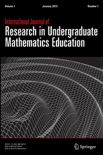
International Journal of Research in Undergraduate Mathematics Education
Scope & Guideline
Fostering Global Collaboration in Mathematics Education
Introduction
Aims and Scopes
- Focus on Undergraduate Mathematics Education:
The journal primarily addresses issues related to the teaching and learning of mathematics at the undergraduate level, emphasizing pedagogical strategies, curriculum design, and student experiences. - Empirical Research and Methodological Diversity:
IJRUME publishes empirical studies employing various research methodologies, including qualitative, quantitative, and mixed-method approaches, to examine mathematical cognition, instructional practices, and educational outcomes. - Innovative Teaching Practices:
The journal highlights innovative practices in mathematics education, including active learning strategies, inquiry-based learning, and the integration of technology in the classroom. - Cultural and Contextual Considerations:
Research that considers the cultural, social, and contextual factors affecting mathematics education is a core area, addressing issues of equity, diversity, and inclusion in undergraduate mathematics. - Assessment and Learning Outcomes:
The journal frequently features studies that investigate assessment practices in mathematics education and their impact on student learning and engagement.
Trending and Emerging
- Active Learning Strategies:
There is a significant increase in research exploring active learning strategies, such as collaborative learning, inquiry-based learning, and problem-based learning, indicating a trend towards more engaging and participatory teaching methods. - Technology Integration in Mathematics Education:
Studies focusing on the use of technology, including digital tools and online platforms, are on the rise, reflecting the growing importance of technology in enhancing mathematical understanding and education. - Student-Centered Learning and Agency:
Research emphasizing student agency, self-regulated learning, and learner-centered pedagogies is gaining traction, highlighting the importance of empowering students in their mathematical learning journeys. - Equity and Diversity in Mathematics Education:
There is a notable increase in studies addressing issues of equity, diversity, and inclusion, particularly concerning underrepresented groups in mathematics, reflecting a broader societal emphasis on equitable educational practices. - Mathematical Thinking and Cognition:
Emerging research is focusing on the cognitive processes involved in mathematical thinking, including studies on reasoning, problem-solving, and the development of mathematical concepts among undergraduate students.
Declining or Waning
- Traditional Lecture-Based Instruction:
There has been a noticeable decline in research focused on traditional lecture-based teaching methods, as the journal increasingly emphasizes active learning and student-centered pedagogies. - Generalized Mathematics Content:
Research that addresses broad, non-contextualized mathematics topics is becoming less frequent, with a shift towards studies that explore specific mathematical concepts or practices in detail. - Teacher-Centered Approaches:
Studies focusing primarily on teacher perspectives without considering student experiences or outcomes are less prevalent, reflecting a growing emphasis on learner-centered research. - Historical Perspectives on Mathematics Education:
While historical analyses have their place, there is a diminishing focus on retrospective studies, as current research trends lean towards contemporary and future-oriented educational practices. - Mathematics Education in Non-Undergraduate Contexts:
Research exploring mathematics education outside the undergraduate context, such as K-12 or adult education, is less represented, as the journal maintains a concentrated focus on undergraduate settings.
Similar Journals
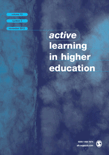
Active Learning in Higher Education
Elevating Learning Experiences in Higher EducationActive Learning in Higher Education is a premier journal dedicated to exploring innovative and effective pedagogical practices within the realm of higher education. Published by SAGE Publications Inc, this journal boasts an impressive Q1 ranking in the Education category for 2023, positioning it within the top percentile of academic journals in the field, with a Scopus rank of 21 out of 1543, reflecting its high impact and relevance. With coverage spanning from 2000 to 2024, the journal serves as a critical platform for researchers, educators, and students, providing insightful articles that delve into the theories, strategies, and technologies that enhance active learning experiences. While currently not open access, the enriching content is vital for anyone aiming to stay abreast of evolving methodologies and empirical studies in educational practices. Located in the United Kingdom, this journal is committed to advancing the academic discourse surrounding higher education, making it essential reading for those interested in fostering student engagement and learning outcomes.

Educational Studies in Mathematics
Elevating Standards in Mathematics Teaching and LearningEducational Studies in Mathematics, published by Springer, is a prestigious journal dedicated to advancing the field of mathematics education. With an impressive impact factor and a distinguished Q1 ranking in both the Education and Mathematics categories as of 2023, the journal plays a vital role in disseminating high-quality research and innovative methodologies. Since its inception in 1968, it has continually provided a platform for educators, researchers, and policymakers to explore the multifaceted relationship between mathematics and education, emphasizing theoretical frameworks, practical applications, and empirical studies. Situated in the Netherlands, this journal boasts a remarkable reputation with its Scopus rankings, placing it among the top percentile in both Mathematics and Social Sciences. Although it does not currently offer open access, Educational Studies in Mathematics remains a crucial resource for those committed to enhancing mathematics education globally.

International Journal of Education in Mathematics Science and Technology
Empowering educators with cutting-edge methodologies and pedagogical strategies.The International Journal of Education in Mathematics Science and Technology (ISSN: 2147-611X, E-ISSN: 2147-611X) is an esteemed publication dedicated to advancing knowledge and research in the fields of mathematics, science, and technology education. Published by Necmettin Erbakan University in Turkey, this journal serves as a vital platform for educators, researchers, and professionals to disseminate innovative methodologies, pedagogical strategies, and educational technologies. With a commendable Q2 ranking in both the Education and Mathematics categories for the year 2022, it clearly exemplifies its impact in these domains, boasting a Scopus rank of #19 out of 74 in Mathematics (miscellaneous) and a position in the 75th percentile. Although the journal has transitioned into open access, it remains committed to fostering a rich dialogue among scholars and practitioners dedicated to enhancing educational outcomes in mathematics and science. Researchers and educators interested in contributing to pedagogical advancements are encouraged to submit their work, thereby playing a part in influencing the future of education.

INSTRUCTIONAL SCIENCE
Empowering educators with evidence-based strategies.INSTRUCTIONAL SCIENCE is a premier academic journal published by Springer that focuses on advancing the field of education through research in instructional methodologies and practices. With an ISSN of 0020-4277 and an E-ISSN of 1573-1952, this journal is recognized for its rigorous scholarly contributions, evident in its impressive 2023 impact factor that places it in the top quartile (Q1) for both Developmental and Educational Psychology and Education. Situated in the Netherlands, the journal has a comprehensive publication history from 1972, making it a respected source for researchers seeking to explore innovative teaching strategies and learning processes. Its Scopus rankings further reflect its esteemed position, ranking #285 out of 1543 in Social Sciences – Education and #99 out of 360 in Psychology – Developmental and Educational Psychology, highlighting its relevance and impact within these fields. While currently not offering Open Access, INSTRUCTIONAL SCIENCE remains a vital resource for educators, psychologists, and students who are committed to fostering effective learning environments through evidence-based practices.

Mathematics Enthusiast
Exploring innovative research in the world of numbers.The Mathematics Enthusiast is a premier open-access journal published by the University of Montana, Department of Mathematical Sciences, dedicated to advancing the field of mathematics through a diverse array of scholarly articles. With its ISSN 1551-3440 and established presence since 2013, the journal aims to foster a collaborative environment for researchers, educators, and students alike by showcasing innovative research and contemporary discussions in the realm of mathematics. As a recognized entity within the field, it holds a category quartile ranking of Q4 in miscellaneous mathematics disciplines and is indexed in Scopus, positioned at Rank #188 out of 399, representing the growing interest and research impact in the mathematical community. The journal is committed to exploring cutting-edge topics and promoting mathematical literacy across various sectors while engaging readers with both theoretical and practical implications of mathematical research. For those interested in the evolving landscape of mathematics, The Mathematics Enthusiast is an essential resource, contributing significantly to academic discourse and professional development.
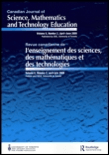
Canadian Journal of Science Mathematics and Technology Education
Exploring New Frontiers in Science, Math, and Technology LearningCanadian Journal of Science Mathematics and Technology Education (ISSN: 1492-6156; E-ISSN: 1942-4051) is a prominent publication by SPRINGER based in Switzerland, dedicated to exploring innovative methodologies and practices in the fields of science, mathematics, and technology education. Established in 2001 and continuing to 2024, the journal maintains a strong reputation within the academic community, reflected in its Q2 ranking in the Education category for 2023 and a commendable Scopus ranking that places it in the top 25% of journals within the social sciences education domain (Rank #383/1543). This journal serves as a critical platform for researchers, educators, and practitioners interested in the latest developments, research findings, and discussions pertaining to instructional strategies and curricular advancements. Although it is not open access, the journal's insights and contributions are invaluable for those aiming to elevate educational practices and address contemporary challenges in STEM education.
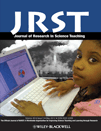
JOURNAL OF RESEARCH IN SCIENCE TEACHING
Pioneering Research for Effective Science InstructionJOURNAL OF RESEARCH IN SCIENCE TEACHING, published by WILEY, is at the forefront of educational research, specifically focusing on the dynamic field of science education. With an impressive Q1 ranking in the education category for 2023 and a percentile of 95th among its peers in Scopus, this journal serves as a critical resource for researchers, educators, and policymakers dedicated to improving teaching and learning practices in science. Established in 1963 and consistently published through 2024, the journal caters to a diverse audience by disseminating rigorous, peer-reviewed research that informs instructional strategies, curriculum development, and assessment techniques. Although it does not currently offer open access, the journal remains a prestigious platform for impactful scholarship in science education, located in Hoboken, NJ. Researchers and professionals alike will find here not only valuable insights but also innovative approaches that are essential to advancing science education in the 21st century.
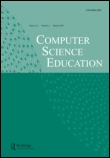
Computer Science Education
Innovating Educational Practices in Computer ScienceComputer Science Education is a prestigious journal published by ROUTLEDGE JOURNALS, TAYLOR & FRANCIS LTD, focusing on the critical intersection of computer science and educational practices. Established in 1988, this journal has become a cornerstone for researchers, educators, and practitioners interested in enhancing teaching methodologies and learning outcomes in computer science. With an impressive ranking within the top quartile (Q1) in both Computer Science (miscellaneous) and Education categories for 2023, as well as high Scopus percentile placements, it underscores its significance in advancing the discipline. The journal offers a platform for innovative research encompassing diverse educational environments and approaches, and while it currently does not offer open access options, it remains committed to disseminating high-quality scholarly work. As a vital resource for anyone looking to contribute to and understand the evolving landscape of computer science education, Computer Science Education continues to shape the future of learning in this dynamic field.

REDIMAT-Revista de Investigacion en Didactica de las Matematicas
Elevating Pedagogical Practices in MathematicsREDIMAT-Revista de Investigacion en Didactica de las Matematicas, published by HIPATIA PRESS, is a leading open-access journal dedicated to advancing research in mathematics education, particularly focusing on didactic methodologies and pedagogical innovations. Since its inception in 2012, the journal has fostered an inclusive platform for academics, educators, and practitioners to disseminate their findings and insights, significantly contributing to the field of mathematics education. With an ISSN of 2014-3621, REDIMAT aims to promote high-quality research and collaboration across diverse educational contexts. The journal not only emphasizes empirical studies but also theoretical developments and practical applications that enhance teaching and learning of mathematics worldwide. By providing a valuable resource for researchers, professionals, and students alike, REDIMAT plays a pivotal role in shaping the future of mathematics education research.
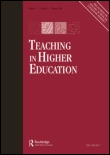
TEACHING IN HIGHER EDUCATION
Advancing pedagogical excellence in higher education.TEACHING IN HIGHER EDUCATION is a premier academic journal published by Routledge Journals, Taylor & Francis Ltd, dedicated to advancing the scholarship and practice of teaching within the higher education sector. With an ISSN of 1356-2517 and an E-ISSN of 1470-1294, this journal is widely recognized for its profound impact in the field, boasting a 2023 category rank of Q1 in Education, placing it in the top tier of educational research. Its commitment to fostering an inclusive and dynamic discourse on pedagogical methods and learning frameworks makes it essential reading for researchers, educators, and policymakers alike. Spanning topics such as student engagement, curriculum development, and innovative teaching strategies, TEACHING IN HIGHER EDUCATION aims to contribute to ongoing conversations and practical applications that enhance the educational landscape. While an Open Access option is not available, the journal maintains a robust readership, with its articles being rigorously peer-reviewed and disseminated to reflect cutting-edge research trends and practices in education.